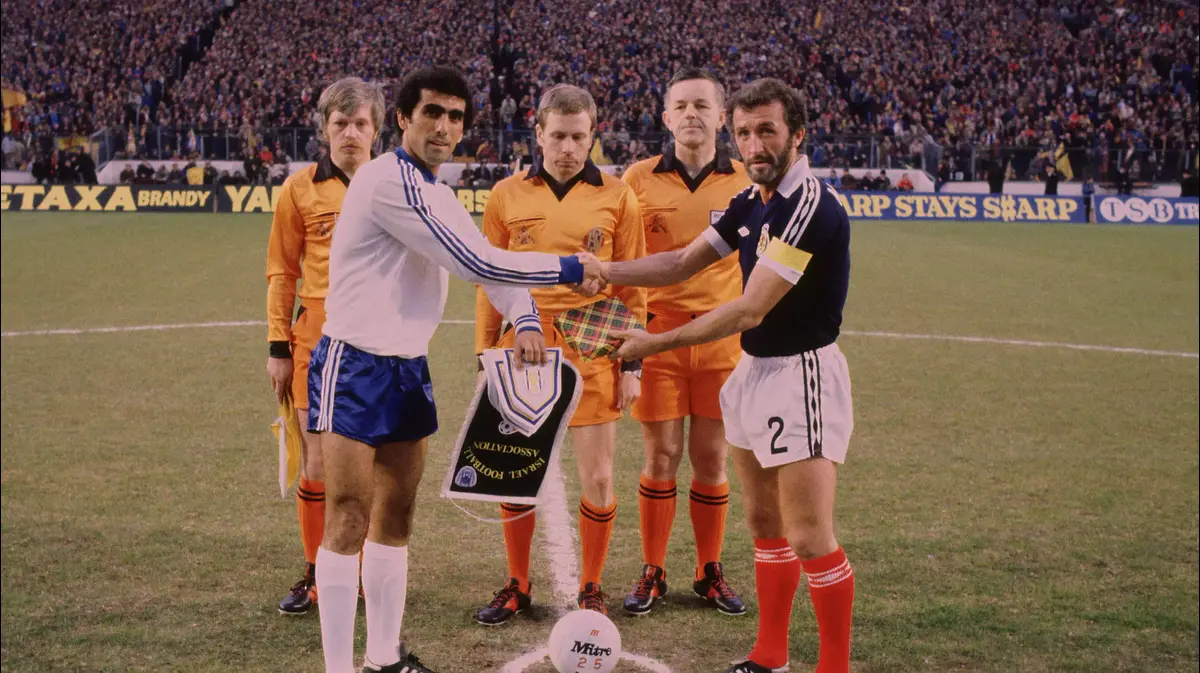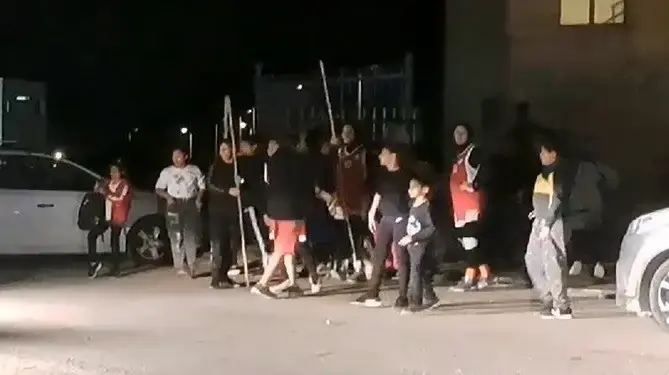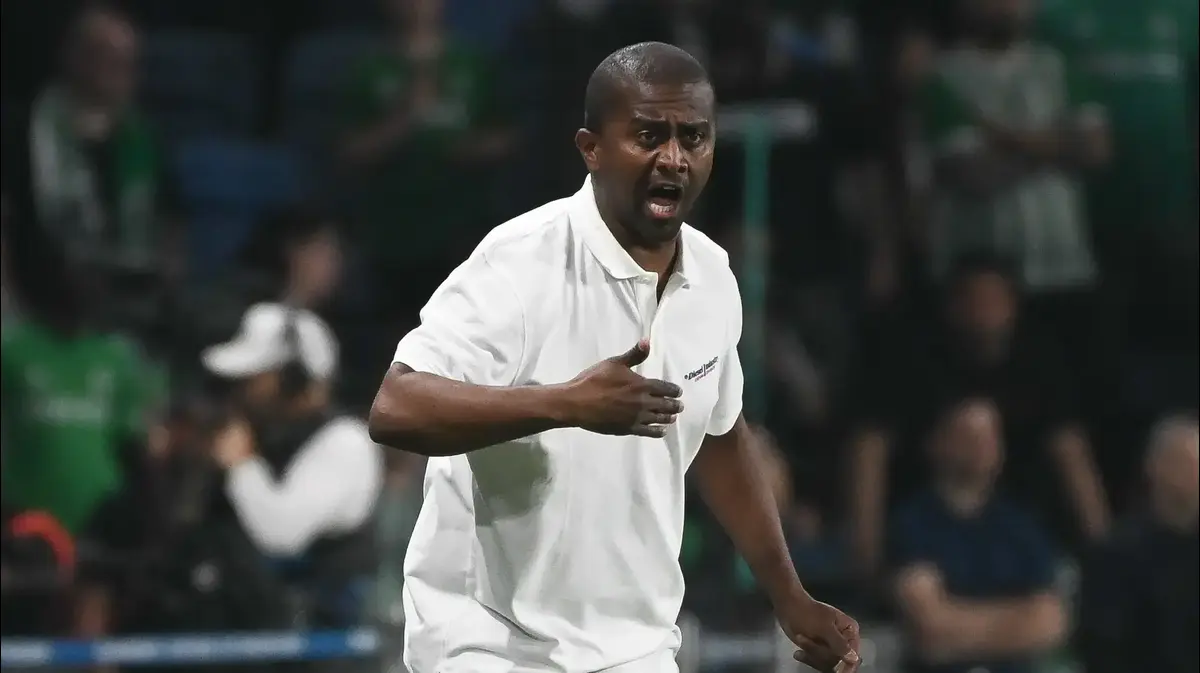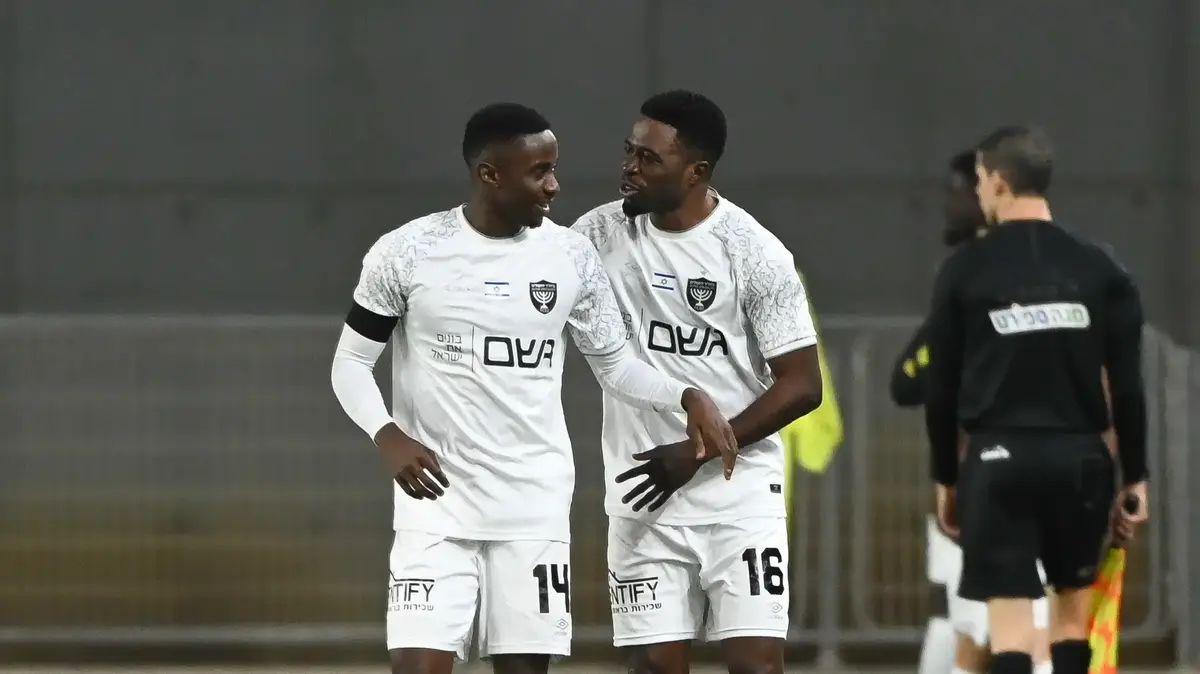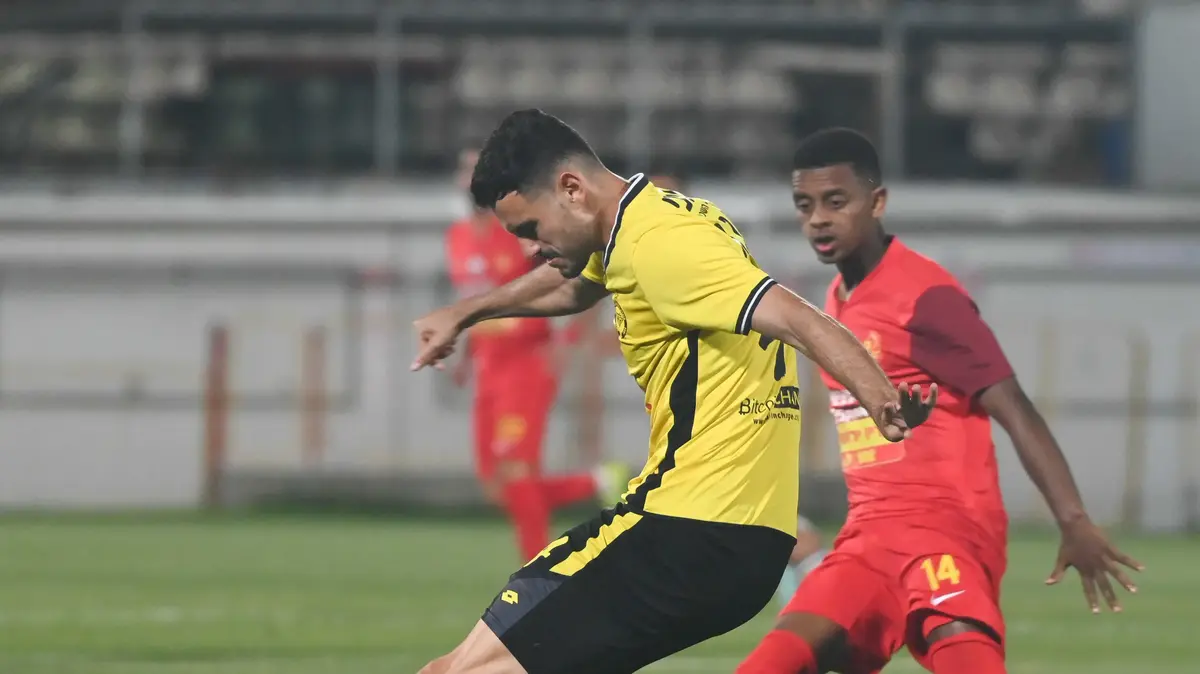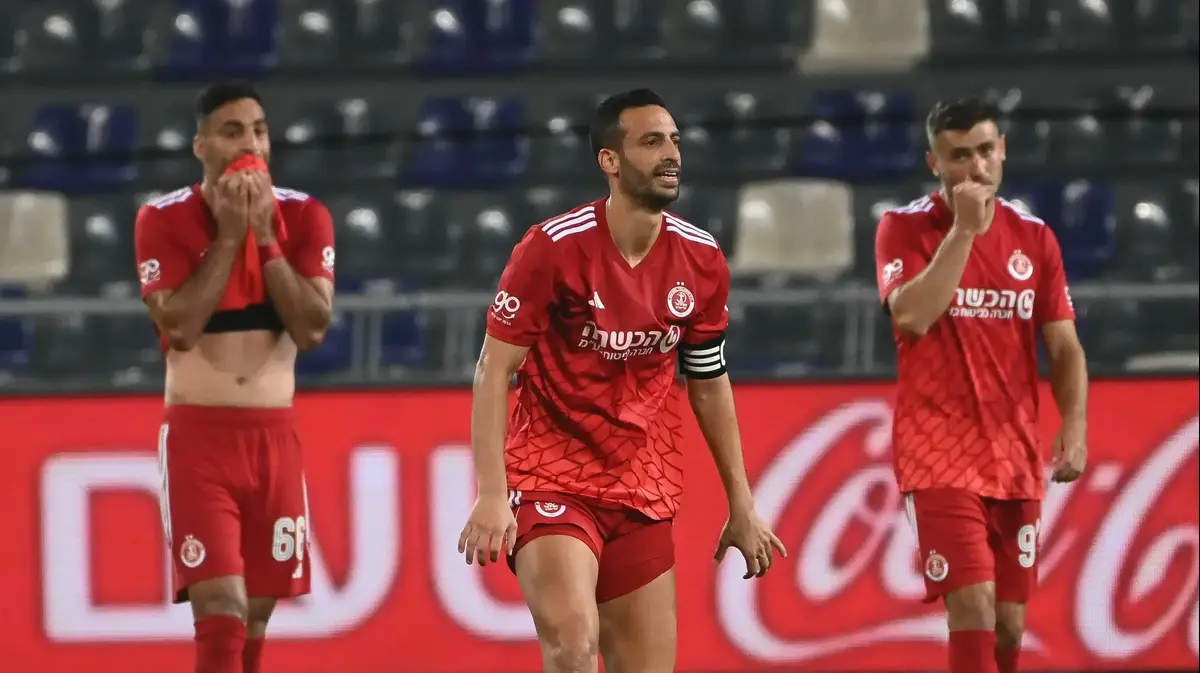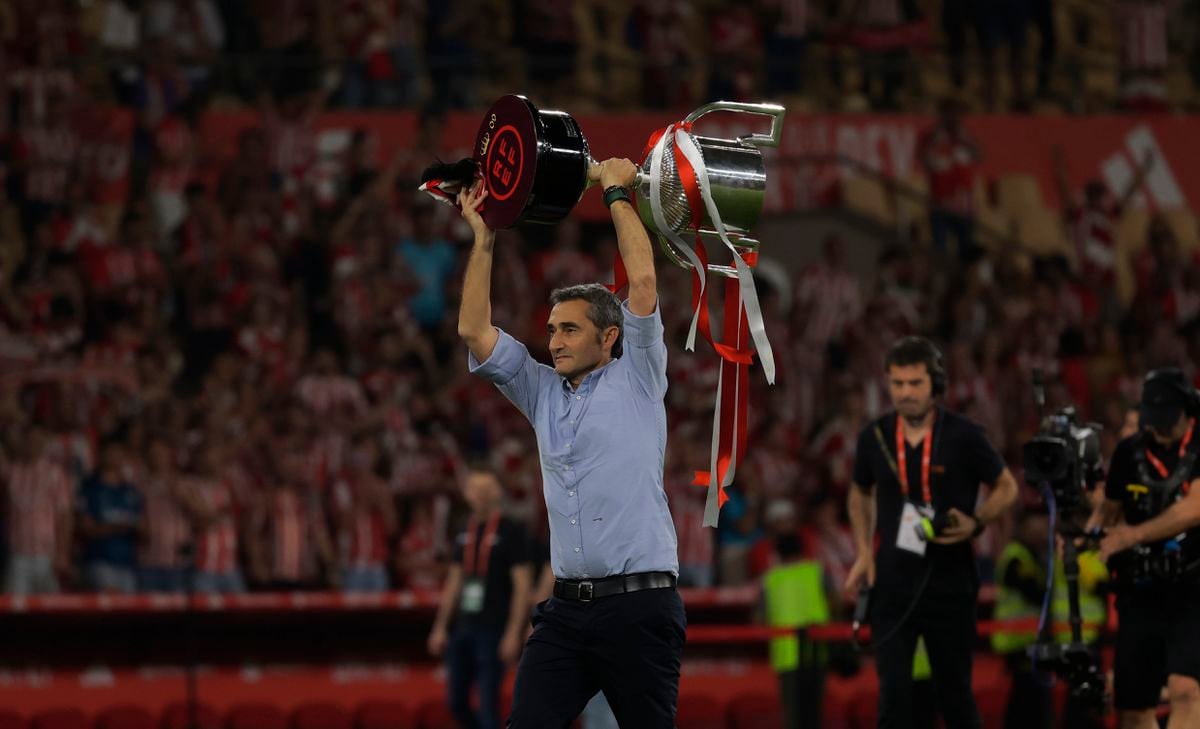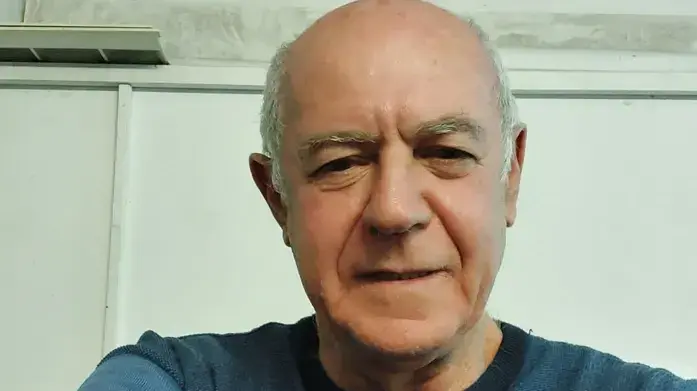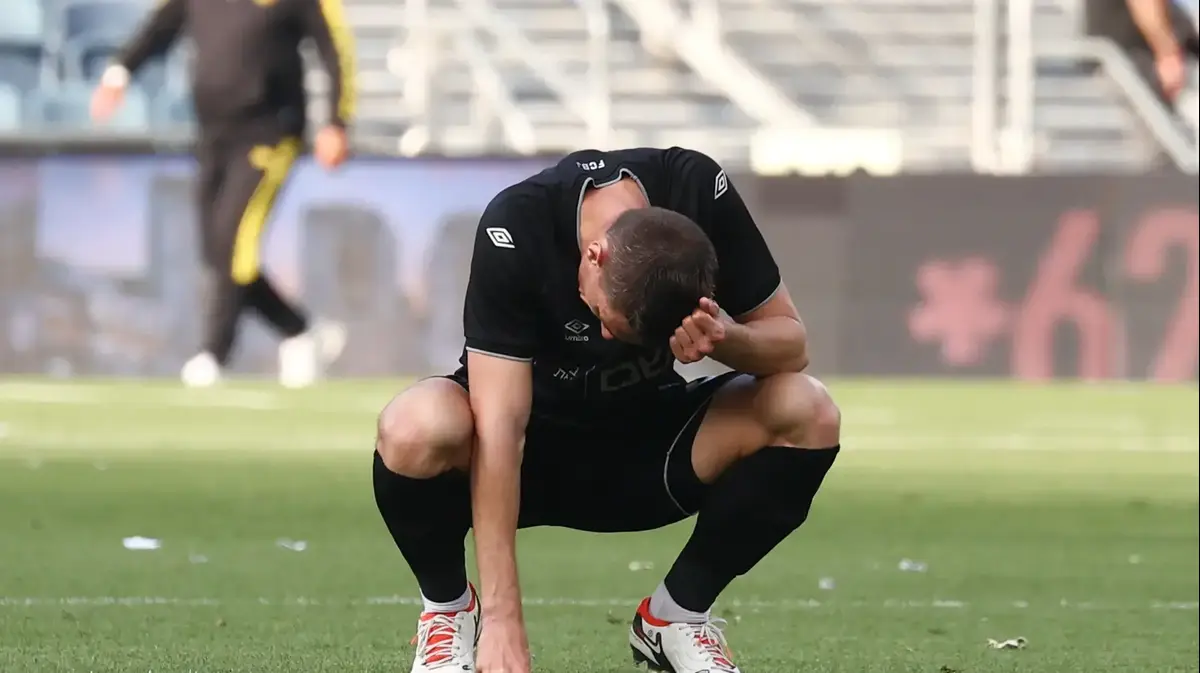Gidi Damti, you have 519 games in Samson Tel Aviv.
Injuries haven't stopped you?
"There was a period of 6 years in which I played continuously in the team. I played with bleeding, with a broken toe and with cracks in my ribs, I received shots and went on the field because the coaches were not ready to give up on me."
They pulled you out of bed on a hot rainy day with 40 degrees, for a game in Netanya.
"I was sick, high fever, confined to bed and not scheduled to play, I didn't go to the game in Netanya. Many fans came to my house, pressured me and took me in a private car. We arrived together with the players' bus. I started in the lineup, I literally went to die in the cold and rain, I left completely at halftime , we lost 1:0".
A big symbol.
Gideon Demati leads the Samson players.
Wednesday: Eli Cohen "The Sheriff" (Photo: Maariv, Reuven Castro)
Gideon "Gidi" Demati was born on October 30, 1951 in Tel Aviv, in the Yemenite vineyard.
"In recent years, after the death of my late mother, I moved to live in Nachalat Yitzhak.
Today I work in a contracting company related to the Tel Aviv municipality, married with 4 children and nine grandchildren."
What was it like growing up in the Yemeni vineyard of the 1950s around football?
"In the vineyard, after the War of Independence, a soccer team was established named after Shimshon Rouzi, a Maccabi Tel Aviv footballer who fell in the war Independence. The residents of the vineyard joined the new group, and the children there, like the adults, joined the Shimshon group which held its training in a sandy field where today the parking lot of the Carmel market stands. Shimshon gathered a lot of local interest, just like Bnei Yehuda in the Ha-Tikva neighborhood."
He began his career at the 'Klisher' school near Shabazi Street, "Studies and soccer right after school. Fini Zvi recognized the talent of my friends and mine in neighborhood soccer. He gathered us on a field near today's parking lot, we stuck beams in the sand and became a soccer team. We loved the The neighborhood games against teams of boys from the streets of Shabazi, the conquerors and the vineyard itself. Many people came to the games on the sandy court to watch the games."
Who were the stars of Samson in the early 1960s that you admired?
"Samshon Tel Aviv qualified in the 1959/60 season from League A to the National League. The revered names were David Atwar, Shimon Cohen, Mordechai Pachi Zadok, Shimon Cohen who came from Po'el Tel Aviv, Eli Cohen the brakeman, Amsili, Avm Mizrahi, Yair Medar, Amnon Japheth and others".
A big star came out of a small neighborhood.
Gideon Demati in the Yemenite vineyard "On the Citizens" (Photo: Maariv, Adi Avishi)
Then he was invited to the senior team.
"I studied at the Shobach Vocational High School on Hamsgar Street. One day our brakeman Eli Cohen came there, the first of many with that name that we later had. I was excited when he asked me to come to the club at noon, to join the senior group. The club was then inside the Carmel Market, In a long row of stalls selling poultry."
You don't forget the ringing slap you get already in the first practice in the seniors.
"I arrived at the training with excitement alongside Moshe Romano ("only saw the net, didn't pass even when we played in the veterans") who came from the GNA, Galili Darhi and the other superstars.
After just a few minutes I was surprised when I received a slap from midfielder Yair Madar.
I burst into tears, I didn't understand why Madar acted like that, and I don't know why to this day.
The managers of the group calmed down the affair together with the veterans, they made it clear that we are all a big family in Samson."
In 1966, an accident happened to his father.
"At that time, the workers of the port of Jaffa and Tel Aviv were moving to the modern port of Ashdod that had been established. Ashdod was then a remote place, and the workers were offered to move there or retire. On Passover Eve 1966, on my father's day off from work, he decided to get on his new Vespa scooter, go out to check what the Port of Ashdod is. Father was a foreman, entered the port and was killed on his day off in a crane accident, a very hard blow to the family."
Not a message even in veterans.
I compared it with Quiche Romano (Photo: Barney Ardov)
In the 1972/73 season, Shimshon Tel Aviv was relegated.
"It was a sporting blow for the entire vineyard, we were relegated to League A together with Hapoel Marmorak. Romano was the top scorer and scored 18 goals out of 36 for the entire team."
He himself was a big star, but without the title of top scorer.
"With the exception of the 1971/72 season, in which we finished in second place, all my first seasons at Samson were in bottom struggles, just not to be relegated. We had a squad of good players, but in most games we were attacked more. At Samson we defended a lot."
In League A (then the Second League) he won the goalscoring title with 27. In one game he found the back of the net seven times in 1:10 against Hapoel Migdal Ha'Emek.
Damati almost repeated the feat in the top league.
"It was in the last league match of the 1975/76 season against Maccabi Ramat Amidar, a match held in Netanya. We won 2:6, when Eli Cohen Sharif, Eli Doan played in Amidar and Shlomo Nordman was in goal. Each goal was more beautiful than the last, I scored four goals in 32 minutes, But they don't mention it in the statistics. In that season I scored 14 goals."
A team to be proud of.
Samson in the 80s, I was pictured in the top row, second from the right (Photo: Maariv, Adi Avishi)
Like many players at the time, he also missed a move to Europe.
"In the early 1970s, Borussia Mönchengladbach was the luxury team of Germany and played against the national team quite a bit. In the fourth visit of the Germans to Israel, in January 1973, the Israeli national team won in a record display 3:4. In that game I made a circus out of the stiff and fast German defense, I scored a beautiful goal. The coach of the national team Emmanuel Shafer, who was a friend of coach Weissweiler, contacted me and made it clear to me that in fact my transfer is closed, the financial terms were also told to me. Shafer spoke about the financial offer to Samson Tel Aviv, and added that upon receiving the approval, they are waiting for me at the training camp of the German team."
And then a strange story from the head of Samson.
"I forwarded the financial offer to the heads of the club, Amos Tov and Shaul Sinwani. They answered me in the affirmative, and said that they were already arranging the move to Germany. They made an appointment with me for the next day at the offices of the 'Puma' company, where they did not arrive. They had no intention of coming or selling me." .
You also had a good financial offer from Beitar Tel Aviv.
"The financial offer was good for me and the money for the club was also good.
There were people who sent a clear message to the heads of the Baytar club that it would be better for them to get rid of me as quickly as possible."
And yes, Maccabi Tel Aviv was also in the picture.
"I played with Maccabi Tel Aviv in the intertoto at the time, they died on me, but when the issue gained momentum and Maccabi Tel Aviv tested against Rashi Shimson, the answer was cold and clear: get off my feet quickly.
The explanation of Ami Paztal, the legendary chairman of the club, made sense .
"Paztal, like Ben Zion Yehudai, loved Shimshon Tel Aviv, gave themselves with great love to the club, along with other good parties. Paztal made it clear to me that the club will receive a lot of money for me, but will have to invest a lot of money in other acquisition players, with whom success is not guaranteed "We know you very well and you are better than others."
Financially and relationally in Samson Tel Aviv did not deprive you financially?
"I'm not crying, I made an apartment in Yad Eliyahu and an apartment in Rishon Lezion out of my contracts in Samson."
He doesn't have a championship or a cup ("We were close to celebrating the lifting of the state cup in the vineyard in May 1986, but we lost in the final at the Ramat Gan stadium 2:1 to Beitar Jerusalem from Malmilian's goal"). "Before the game we knew, like Kfar Saba, that a draw would be enough for Samson to stay in the league and for them to win the championship.
Both teams did not want to take a risk, they did everything to end in a draw.
The game was about driving a ball in the middle of the field without trying to score a goal.
Even in Europe to this day it is accepted."
Professional malpractice.
I looked like my brother Benny (photo: Maariv, Adi Avishi)
Who are the players you especially liked to play with?
"There were big and unforgettable names in the group such as Shimon Cohen, the late David Shoukian, Shlomo Mizrahi, Avinoam Ovadia, Arbiv, Shia Pigenboys, Vicky Peretz, but the special and great one was Yoel Masuari, a giant among the giants.
The understanding between us was like the neighborhood games, with our eyes closed.
There were times when Masuri burst in front of a goalkeeper alone.
I just shouted at him 'Druch', he stepped on the ball and left me a goal in front of an open net."
Your brother Benny was a footballer who was wronged professionally.
"Benny was a very good player with a tremendous left foot and a fantastic head game.
In any action or game he was compared to me, he would lose confidence because of that.
We played together in Samson and I scored several beautiful goals, some of them with strikes.
My son went into quarantine, went to America and later played well in Zafarir Holon and other teams.
Even when I asked to allow him to be released from the club I did not succeed, it was Samson."
In the two games against South Korea, he met Cha Bum Kun for the first time.
"The Israel national team had previous matches with South Korea, including teams in the Asian championships. The name Boom Kon was familiar to all of us. In the first match we ended in a 0:0 draw. Five days later, another match against them. Our whole country followed the match, the drama was in overtime, In the 109th minute Boom Kon scored and sadly took us off the field."
Two years later he got his revenge in the qualifiers for the Montreal 1976 Olympics. "We beat the Japanese team twice - away 0:3 with one goal of mine, RB 1:4 in a game in which I also scored.
Our training for the game in Seoul in April 1976 was full of soccer spies from Korea who did not know the new players of Israel.
In training, Ehud Ben Tovim was placed in the central striker position, the whole tactic was to pass to him.
The local coach followed David Schweitzer's bluff, when he changed part of his team's back line.
It worked great for Israel, because South Korea was preparing for the huge Ben Tovim that the balls would go to.
Ehud didn't play at all.
We won 1:3, and on April 28 we finished 0:0 and got the ticket to Montreal."
21 goals in 69 appearances.
I represented the national team (Photo: Government Press Office, Moshe Milner)
In the Israeli national team he flourished - 69 games with 21 conquests.
"In May 1973, the 1974 World Cup qualification tournament in Germany took place in Seoul, South Korea. We had a very strong team. We beat Japan, Malaysia and Thailand twice in the tournament, and then we met the host team South Korea."
In Canada, the delegation was carefully guarded, in the shadow of the memory from Munich 1972. "In the quarter-finals we lost to Brazil 4:1 after 0:0 at halftime. Brazil's warm-up was in the dressing room. We had silence, they sang and danced and we heard them throughout the complex. At our place, no one tried to sing , it doesn't seem serious then."
In 1979 the Olympic team played in the qualifiers for the Moscow Olympics.
She did not qualify, and in any case would not have appeared there because of the Western boycott.
"The interesting match was against the Olympic Netherlands, in the city of Aman. Until the 72nd minute, Israel trailed 3:0. I scored two goals, including a goal in the 89th minute, and together with Vicky Peretz and a Dutch own goal, Israel won 3:4, a home in which Spain finished first".
Jack Mansell coached the team starting in 1980, after Emmanuel Shafer was appointed instead.
He appointed Dammit as captain.
"Mansel decided to replace the captain Yitzhak Shum. We were in a training camp in Shafiim, he called all the players to his room one by one, and announced that in the 1982 World Cup qualifiers Gideon Demati was the new national captain.
"Mansel tried to give the team a different, loose and attacking style.
He held me in an unusual way.
In every professional exercise on the field, he would tell me that for me it was an easy and understandable exercise.
Mansell brought Giora Spiegel back to the team, in the match in Stockholm against Sweden I scored the equalizing goal, 1:1 at the end.
From this campaign, I remember mainly the victory over Portugal in RG, 1:4 from a hat-trick by Benny Tabak and one goal by me."
Who did you especially like to play with in the Israeli national team?
"With Spiegler, Spiegel and Shum was an experience. The late Avi Cohen was a close friend and a great player, I also enjoyed the late Shalom Schwartz. I loved collaborating with the great Uri Malmilian the most, the understanding between us was blind, he understood football perfectly."
Mansell grabbed from him.
Damati before the match against Scotland in the World Cup qualifiers in 1981 (Photo: Reuters)
He had experience playing in the American Indoor League in St. Louis.
"In the mid-eighties, I flew there. They asked for a release form. The managers of Samson ignored my requests, I stayed there for 6 league rounds in Israel, I had to return to Samson Tel Aviv."
At the end of the 1988/9 season he retired from football when he was 38.5 years old.
"The team finished in sixth place in the upper house, we reached the semi-final stage of the cup, where we were eliminated by Maccabi Haifa in two games, after 1:1, we lost in the return leg 3:1. Many fans tried to convince me to continue, they asked me what will happen now with Shimshon Tel Spring without Gidi Damitti."
And what really happened?
"Samshon finished last in the top league, we were relegated to the national league, only seven wins out of 32 games."
There was an attempt to bring you back from retirement in the middle of the season.
"I became the manager of Samshon's youth department. Before the winter break and the transfers, the managers of Hapoel Azor from League A came to me and offered me a respectable financial grant to help the team move up to the league. They registered me with the football association, but in view of Samshon's bad position in the table they asked me to return, they saw In training, to which I occasionally added that I was in good shape. On the last day of transfers, I arrived at the association's offices to renew my player card, but the law at the time was that after I had signed in the region, I could not return to my previous team. I gave up and Samson went down. The team's downfall began there."
sport
Israeli soccer
Super League
Tags
Samson Tel Aviv
Gideon Demati

